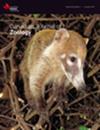人工智能(BirdNET)补充人工方法,从区域监测产生的声学数据集中最大限度地提高鸟类物种丰富度
IF 1.1
4区 生物学
Q3 ZOOLOGY
引用次数: 0
摘要
从区域监测项目获得的声学记录中最大限度地提高物种丰富度的处理方法可以增加对稀有、稀有和隐蔽物种的检测,并提供物种状态和分布的关键信息。利用加拿大育空地区鸟类监测的数据,我们(1)比较了检测到的鸟类物种数量(物种丰富度)和四种声学处理方法(听觉、视觉扫描、识别器、带验证的识别器)的相关成本;以及(2)将听力和识别器与验证信息相结合,以增加对生态区域尺度上所有鸟类物种的检测。我们使用全面的视觉扫描来检测记录中的所有鸟类。我们使用Listening处理了约1%的记录,并用71.5小时的人类努力检测了56%的鸟类群落。我们使用了带验证的识别器(多物种识别器BirdNET),并检测到89%的鸟类群落,视觉扫描所需的工作量约为22%(分别为56和257小时)。作为我们方法的一个应用,我们将“倾听和识别器”与“验证”相结合,处理了五个北方生态区的记录,发现在几乎没有额外努力的情况下,检测到的鸟类数量增加了23-63%。将监听和识别器与验证相结合,可以最大限度地利用大型被动声学监测(PAM)数据集进行物种检测。本文章由计算机程序翻译,如有差异,请以英文原文为准。
Artificial intelligence (BirdNET) supplements manual methods to maximize bird species richness from acoustic datasets generated from regional monitoring
Processing methods that maximize species richness from acoustic recordings obtained from regional monitoring programs can increase detections of uncommon, rare, and cryptic species and provide key information on species status and distribution. Using data from a regional bird monitoring in Yukon, Canada, we (1) compared the number of bird species detected (species richness) and the cost associated with four acoustic processing methods (Listening, Visual Scanning, Recognizer, Recognizer with Validation); and (2) combined Listening and Recognizer with Validation information to increase detections of all bird species at the ecoregion scale. We used comprehensive Visual Scanning to detect all bird species on the recordings. We processed ~1% of the recordings using Listening and detected 56% of the bird community with 71.5 hours of human effort. We used Recognizer (multispecies recognizer BirdNET) with Validation and detected 89% of the bird community with ~22% of the effort required for Visual Scanning (56 and 257 hours respectively). As an application of our approach, we combined Listening and Recognizer with Validation to process recordings from five northern ecoregions and found a 23-63% increase in the number of bird species detected with little additional effort. Combining Listening and Recognizer with Validation can maximize species detections from large passive acoustic monitoring (PAM) datasets.
求助全文
通过发布文献求助,成功后即可免费获取论文全文。
去求助
来源期刊

Canadian Journal of Zoology
生物-动物学
CiteScore
2.40
自引率
0.00%
发文量
82
审稿时长
3 months
期刊介绍:
Published since 1929, the Canadian Journal of Zoology is a monthly journal that reports on primary research contributed by respected international scientists in the broad field of zoology, including behaviour, biochemistry and physiology, developmental biology, ecology, genetics, morphology and ultrastructure, parasitology and pathology, and systematics and evolution. It also invites experts to submit review articles on topics of current interest.
 求助内容:
求助内容: 应助结果提醒方式:
应助结果提醒方式:


